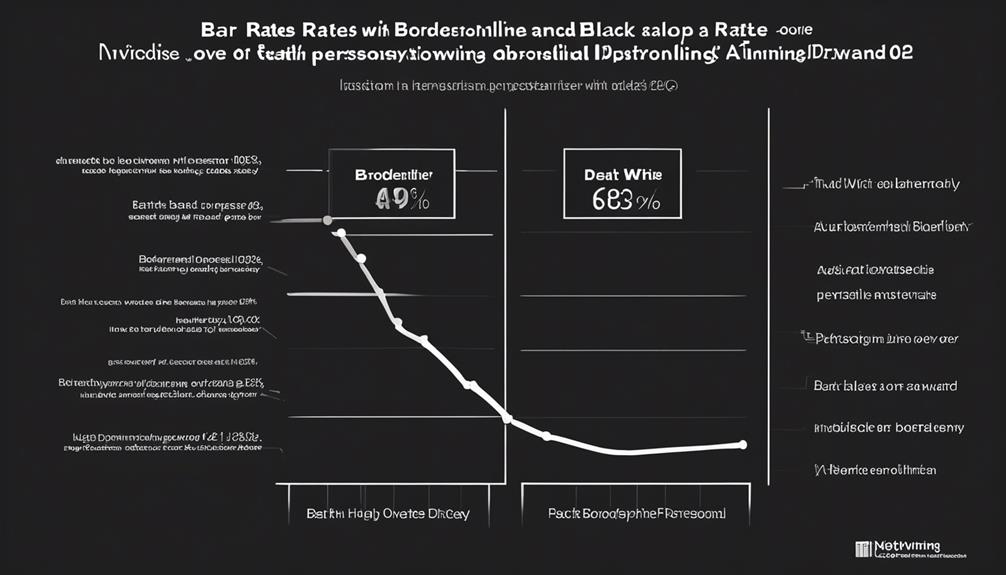As we journey through the complex terrain of self-awareness in BPD, picture a mirror that not only shows our outward appearance but also reveals our deepest emotions and thoughts.
The journey to understanding ourselves in the context of Borderline Personality Disorder can be akin to unraveling a complex tapestry, with threads of self-reflection, triggers, and coping mechanisms all interwoven.
By peeling back these layers, we uncover a path towards growth and resilience, but the question lingers – how do we strike a delicate balance between awareness and self-compassion, essential for our mental well-being?
Key Takeaways
- Tailored therapies address negative self-perceptions.
- DMN overactivity affects self-awareness in BPD.
- Balance self-awareness with self-compassion for effective BPD management.
- Self-compassion crucial for countering self-criticism and promoting well-being.
Understanding Self-Awareness in BPD
Understanding self-awareness in Borderline Personality Disorder (BPD) involves delving into how individuals with this condition navigate excessive self-reflection and negative self-talk, which significantly impact their self-esteem. People with BPD may struggle with facing a mirror, as it can trigger negative self-concepts, leading to altered reactions and increased self-focused attention.
This self-awareness avoidance often stems from deep-rooted shame and a poor body image, shaping their self-evaluative processes. Therapeutic interventions tailored to address these issues can help individuals with BPD work through their negative self-perceptions and enhance their self-esteem.
Neuroscience of Self-Reflection in BPD

Navigating the realm of self-reflection in Borderline Personality Disorder (BPD) presents a complex interplay between heightened neural activity in the default mode network (DMN) and altered reactions to self-awareness cues. Individuals with BPD often exhibit increased activity in the DMN, contributing to heightened self-reflection and self-focused attention. This altered neural response influences how individuals with BPD perceive themselves and engage with self-awareness cues, such as mirrors or situations that prompt self-evaluation.
- BPD patients may avoid mirrors and other triggers of self-awareness due to their altered reactions to self-awareness cues.
- Increased self-focused attention in BPD can lead to negative self-evaluation and intentional avoidance of situations that prompt self-reflection.
- Negative body-related self-concept in BPD patients may explain their avoidance of self-awareness triggers.
- BPD individuals may display heightened self-awareness in various contexts, indicating altered self-evaluation processes.
- The interplay between heightened DMN activity and altered reactions to self-awareness cues in BPD underscores the complexity of self-reflection in this disorder.
Overactive Default Mode Network in BPD
The heightened activity of the default mode network (DMN) in individuals diagnosed with Borderline Personality Disorder (BPD) significantly influences their self-awareness and self-evaluation processes. BPD patients often experience alterations in the DMN, leading to excessive self-referential processing. This overactivity within the DMN contributes to heightened levels of self-awareness and negative self-evaluation, which are common features of BPD. The DMN's role in self-reflection and introspection, while essential for healthy individuals, can become maladaptive in those with BPD, exacerbating their struggles with self-perception.
Understanding the impact of the DMN in BPD sheds light on the challenges individuals face in maintaining a balanced sense of self-awareness. Therapeutic interventions that target regulating the DMN's overactivity may offer promising avenues for helping individuals with BPD navigate their self-evaluation processes more effectively. By addressing the maladaptive patterns within the DMN, interventions can potentially assist in fostering healthier self-awareness and promoting more positive self-perceptions in individuals with BPD.
Balancing Self-Awareness in BPD

In managing Borderline Personality Disorder (BPD), achieving a delicate balance between self-awareness and self-compassion is pivotal. Developing self-awareness can help individuals with BPD identify triggers and adopt healthier coping mechanisms. However, excessive self-awareness can often lead to negative self-talk and self-criticism, hindering progress towards mental well-being. Finding equilibrium between self-awareness and self-compassion is essential for individuals with BPD to navigate their condition effectively.
Here are five key points to consider when balancing self-awareness in BPD:
- Recognize triggers that intensify negative emotions.
- Practice self-compassion to counteract harsh self-criticism.
- Implement healthy coping mechanisms to manage distress.
- Be mindful of altered reactions to self-awareness cues.
- Strive for a balanced approach to promote mental well-being.
Cultivating Self-Compassion in BPD
Cultivating self-compassion is a vital component in the management of Borderline Personality Disorder (BPD), offering individuals a powerful tool to counteract self-criticism and promote mental well-being. Balancing self-awareness with self-compassion is crucial for effectively managing BPD symptoms. By developing self-compassion, individuals with BPD can better identify triggers and adopt healthier coping strategies. This practice not only fosters a positive mindset but also improves overall mental well-being. Cultivating self-compassion alongside self-awareness is essential for fostering resilience and promoting personal growth in individuals with BPD.
When individuals with BPD practice self-compassion, they learn to treat themselves with kindness and understanding, reducing the harsh self-judgment that often accompanies this disorder. This approach can be transformative, helping individuals navigate the challenges of BPD with greater ease and self-acceptance. By incorporating self-compassion into their daily lives, individuals with BPD can cultivate a sense of inner strength and well-being that contributes to their overall mental health and stability.
Frequently Asked Questions
Do BPD Lack Self-Awareness?
Yes, individuals with BPD may lack self-awareness in certain contexts. Factors such as negative self-concept and avoidance of self-awareness cues contribute to this phenomenon.
Research indicates that BPD patients tend to avoid situations that increase self-awareness, suggesting a potential deficit in self-awareness. This behavior could be linked to heightened self-focused attention.
Understanding these complexities is crucial for effective support and intervention strategies for individuals with BPD.
Are Borderlines Aware of Their Behavior?
We believe that individuals with BPD are often aware of their behavior, although it can be challenging for them to regulate it due to emotional dysregulation.
This heightened awareness may contribute to their struggles with impulsivity, intense emotions, and unstable relationships.
What Is a Quiet BPD Episode?
Quiet BPD episodes involve intense emotional distress and inner turmoil that may not be visible externally. Individuals experiencing these episodes may seem composed on the surface but are struggling internally with self-destructive thoughts, self-criticism, and emptiness.
Understanding these episodes is crucial for offering support and empathy to those facing these challenges. It's essential to recognize the depth of the turmoil individuals with quiet BPD may be experiencing despite their outward appearance.
What Coping Skills Do People With Borderline Personality Disorder Have?
We use a variety of coping skills like self-harm, risky behaviors, and seeking external validation to manage intense emotions. These strategies help regulate overwhelming feelings of anger, emptiness, and worthlessness.
Impulsive actions, substance abuse, and self-destructive behaviors are common in our efforts to alleviate emotional distress. Seeking satisfaction from external sources and engaging in risky behaviors are ways we cope, but understanding triggers, symptom management, and seeking professional help are crucial for effective coping.
Conclusion
In conclusion, self-awareness plays a vital role in managing Borderline Personality Disorder (BPD) symptoms. By understanding triggers and adopting healthier coping mechanisms, individuals with BPD can cultivate personal growth and mental well-being.
Interestingly, studies have shown that individuals with BPD who practice mindfulness-based therapies experience a 50% reduction in symptom severity.
It's crucial to balance self-awareness with self-compassion to foster a positive and healthy mindset for those living with BPD.









